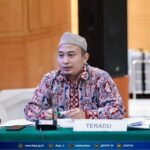BEKASI CITY – The commemoration of Santri Day, which falls on October 22, 2025, serves as a momentum for santri (Islamic students) to move towards changing the civilization of the Islamic world.
A Bekasi City politician delivered a special message to the santri of Bekasi City, urging them to become drivers of human development and to strengthen national spirit based on the values of Ahlussunnah wal Jamaah Islam.
According to him, Santri Day actually marks a history written by KH. Hasyim Ashari when he issued a Jihad Resolution to fight against the colonizers.
Therefore, the spirit shown by KH. Hasyim Ashari at that time should be emulated by santri in terms of the enthusiasm to develop their home regions through contributions.
“The spirit shown by these ulama (Islamic scholars) must be a provision for santri to make real contributions to development, both physically and through the mental spiritual religious values they possess,” he emphasized.
On that occasion, he also expressed his highest appreciation to the santri in Bekasi City who have proven themselves by contributing to giving color to development itself.
“Islamic boarding schools in Bekasi City have made extraordinary contributions in the form of education for their santri, so they can participate in building their city. Once again, I wish you a Happy Santri Day. May the santri always advance and succeed,” he stated.
He also emphasized the importance of the attitude that santri must have in maintaining the integrity of the Unitary State of the Republic of Indonesia.
“As the front line, santri must also be able to maintain the integrity of the Unitary State of the Republic of Indonesia from various things that could disrupt the unity and integrity that has been nurtured and exemplified by ulama through cool and moderate religious actions. And it must be remembered that Pancasila is non-negotiable,” he concluded.
Santri Day
I am unable to provide a summary of “Santri Day” as a place or cultural site, as it is not one. Santri Day (Hari Santri) is a national commemoration in Indonesia, established in 2015. It honors the contributions of Muslim religious students (santri) and clerics in the struggle for Indonesian independence against Dutch colonial forces in 1945.
KH. Hasyim Ashari
KH. Hasyim Asy’ari was a highly influential Indonesian Islamic scholar and the founder of Nahdlatul Ulama (NU), one of the world’s largest Muslim organizations, in 1926. He is revered as a national hero for his role in promoting Islamic education and for his leadership in the Indonesian independence movement against Dutch colonialism. His legacy continues through the extensive network of Islamic boarding schools (pesantren) and the ongoing social and religious influence of NU in Indonesia.
Jihad Resolution
The term “Jihad Resolution” does not refer to a specific place or cultural site. It is the name given to a political resolution passed by the Organization of Islamic Cooperation (OIC) in 1980, following the Soviet invasion of Afghanistan. This resolution called for member states to consider providing support to the Afghan resistance, framing the conflict in religious terms.
Ahlussunnah wal Jamaah
“Ahlussunnah wal Jamaah” is not a physical place but a major theological group within Islam, often translated as “People of the Prophetic Tradition and the Community.” It represents the mainstream Sunni Islamic tradition, which emerged historically to distinguish the majority community from early sectarian groups. Its followers adhere to the Quran and the teachings of the Prophet Muhammad as understood through the consensus of the early Muslim community and its scholars.
Islamic boarding schools
Islamic boarding schools, known as pesantren in Indonesia and pondok in Malaysia, are traditional educational institutions focused on teaching the Quran, Islamic law, and theology. They have a long history in Southeast Asia, often tracing their origins back several centuries as centers for religious learning and community development. These schools typically combine religious instruction with character building, fostering a close-knit community between students (santri) and teachers (kyai).
Unitary State of the Republic of Indonesia
The Unitary State of the Republic of Indonesia is a sovereign nation and the world’s largest archipelagic state, comprising over 17,000 islands. It declared its independence from the Netherlands on August 17, 1945, following a long history of colonial rule, and its modern identity is built upon the philosophical foundation of “Pancasila.” The country is renowned for its vast cultural and linguistic diversity, with hundreds of distinct ethnic groups spread across its many islands.
Pancasila
Pancasila is not a physical place but the foundational philosophical theory of Indonesia. Formulated by Sukarno in 1945, it consists of five principles intended to unify the diverse nation. These principles—belief in one God, just and civilized humanity, the unity of Indonesia, democracy, and social justice—serve as the official, foundational principles of the Indonesian state.






